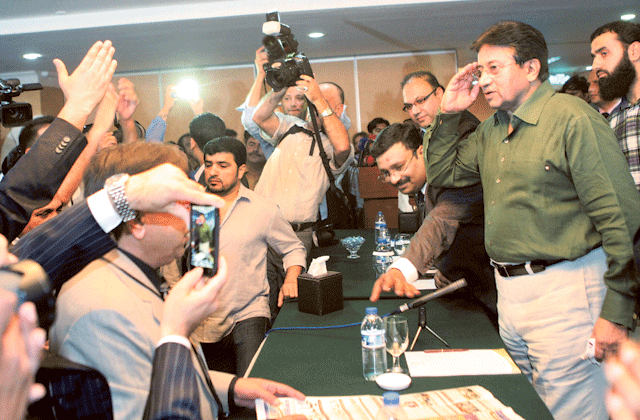
Islamabad: Pakistan’s caretaker government told the Supreme Court here Monday that it cannot initiate a treason case against former president Pervez Musharraf as the matter was not within its limited mandate.
The move will give at least temporary breathing room to Musharraf, who is already under house arrest in connection with one of three other cases dating back to his 1999-2008 period in office.
The cases are being heard in lower courts.
He has been threatened with death by the Taliban and barred from running in next month’s general election, a humiliating blow to the retired general who returned home in March promising to “save” Pakistan after four years in exile.
The government’s response was conveyed to a three-judge bench hearing petitions seeking the former military ruler’s trial for treason under Article 6 of the Constitution on the basis of imposition of emergency and suspension of the constitution by him on November 3, 2007.
Under the constitution, only the federal government has authority to initiate a treason case and the court had asked the caretaker setup to apprise it of the federation’s stance.
In its reply, the caretaker said it had a limited mandate, which was mainly to ensure the holding of a free and fair election, adding that it needs to avoid committing to any process that may not be “reversible” by the elected government to be formed after the elections scheduled for May 11.
It referred to a working paper by an NGO called Democracy Reporting International which calls for an interim set-up to avoid major policy decisions, refrain from making appointments on key posts and avoid signing any major contracts or international treaties.
After receiving the caretaker government’s response, the court adjourned the hearing to Tuesday.
The former president is currently in the custody of Adiyala Jail authorities at his farmhouse which was declared a sub-jail last week after an anti-terrorism court granted his 14-day judicial remand in a case involving charges of detaining over 60 judges of superior courts in 2007.
He will be produced before the anti-terrorism court again on May 4, according to the judge’s order.
“The caretaker government should avoid taking any controversial step and should not commit any process that is not reversible by the incoming elected government,” the administration said in a statement read out in Pakistan’s top court.
The Supreme Court is hearing a petition from lawyers demanding that Musharraf face trial for treason for subverting the constitution. In Pakistan only the state can initiate charges of treason, which can carry the death penalty.
The interim administration, which took office last month, is tasked with guiding the nuclear-armed country of 180 million towards the May 11 vote, which will mark a historic democratic transition of power in a country used to periods of military rule.
The administration will step down after the new elected government takes office and as a result said it had no mandate to order a trial of Musharraf for treason.
With less than three weeks to go, it said overseeing the vote was a full-time job, not least given the threat level against candidates. The Taliban have claimed a series of deadly attacks on politicians and political parties.
The government cautioned there was “no urgency” to try Musharraf and said it needed “to confine their work to day-to-day routine matters” and “maintain the status quo” for the incoming elected government.
Musharraf is serving his two-week arrest order in his luxury villa in the upmarket suburb of Chak Shahzad on the edge of Islamabad.
His arrest was ordered by an anti-terrorism court on Saturday in connection with the sacking of judges when he imposed emergency rule in November 2007.
On Sunday, his party spokesman said he had been confined to two rooms and stripped of his personal staff, with his lawyers also denied access.
Musharraf faces separate charges of conspiracy to murder opposition leader Benazir Bhutto in 2007 and over the 2006 death of a Baluch rebel leader.
The Supreme Court adjourned hearing the treason petition until Tuesday and ordered the authorities to allow Musharraf’s lawyers to meet him.
Presiding Judge Jawad S Khwaja told the court: “It appears that the government is determined not to take any legal action in this matter.”












